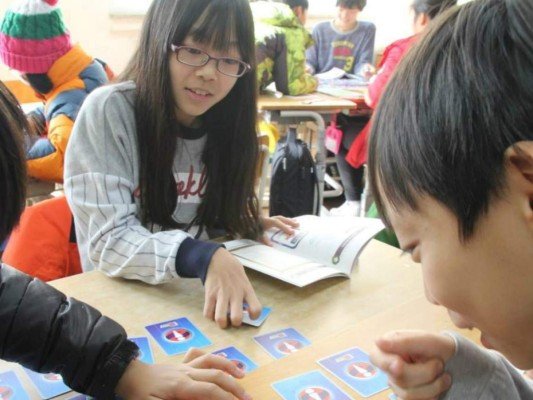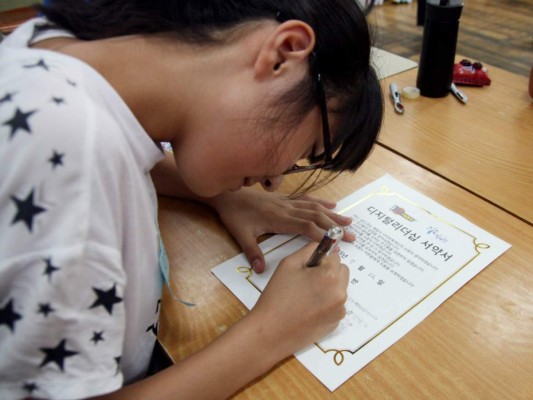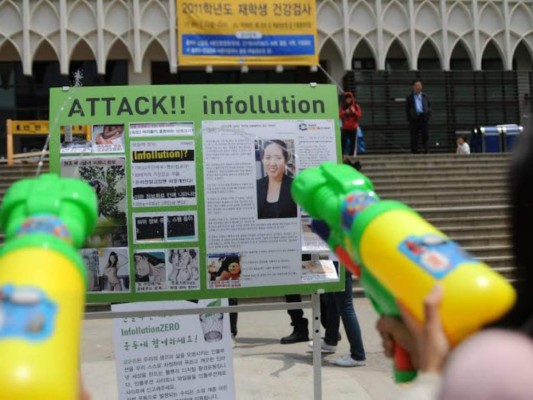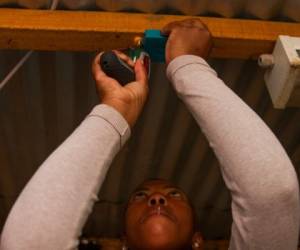When Dong-A Ilbo reporters offered to pay a certain amount of money for a date on a smartphone random chatting application the other week, they received about 30 messages for dates in return for cash. Random chatting apps are smartphone programs for chatting with anonymous users. There are hundreds of such apps on app markets such as Google's Play Store.
As the apps do not require users to go through an identification process, adult men offer money to teenage girls for sex. After the reporters signed up on some apps as a minor, they received endless messages from adult men offering money for a date.
'It is not easy to check all of the hundreds of random chatting apps with limited manpower resources,' a police officer said. 'We have shut down some apps where prostitution deals actually occurred. But developers reintroduce them by changing their names.'
With one of the world's fastest fixed-line and mobile high-speech Internet network and more than 80 percent of the population using smartphones, South Korea is facing a serious issue of infollution, which is a combination of 'information' and 'pollution' and refers to online obscenity, violent games, cyber bullying and distorted online information. Coined by a South Korean civic group 'Infollution Zero,' the term has now become a major issue in the global digital world.
Since the early 2000s, there has been a ceaseless game of 'hide and seek' between the government cracking down on cyber crimes against children and juveniles and those who are trying to escape crackdowns. Relevant laws had been made, but new cyber crimes abusing them have been occurring.
A typical case is the abuse of a law subjecting those who defame others with false information to up to seven years of imprisonment, up to 10 years of suspension of qualifications or up to 50 million won (42,772 U.S. dollars) in fines. 'Settlement money hunters' induce teenagers to leave hate or malicious comments. For example, they intentionally provoke others while playing online games and cause teenagers to swear. Then, the 'settlement money hunters' captures the screen showing the foul language and use them to file a lawsuit against the teenagers. Concerned about their children's future, parents tend to make settlements with the plaintiffs by paying 2 million won (1,711 dollars) to 5 million won (4,277 dollars).
Although the types of cyber crimes are increasing in Korea, less children and juveniles experience cyber violence thanks to efforts by the government and civic groups.
According to a joint survey by the Ministry of Science, ICT and Future Planning and the Korea Internet & Security Agency (KISA), 17.2 percent of elementary and secondary school students experienced cyber violence last year, down from 30.3 percent in 2013. The government categorizes cyber violence into six types -- cyber verbal violence, cyber defamation, cyber stalking, cyber bullying, leakage of personal information, and cyber sexual violence.
KISA said it sends professional instructors to elementary schools and local childcare centers across the country to provide education against cyber violence and help them understand the problem by playing the roles of victims or inflictors in order to prevent cyber violence.
With cyber violence emerging as a major social problem, the government's second package of measures to protect juveniles announced in April includes many policies regarding teenagers' Internet usage. In particular, the government plans to strengthen its monitoring of newly opening 'harmful media' such as personal webcasting and porn-sharing websites. State media watchdogs, such as the Korea Communications Standards Commission and the Korea Media Rating Board, will also strengthen their cooperation to more quickly respond to newly opening 'harmful media.'
Various new regulations aimed at preventing children and teenagers from being exposed to infollution have caused friction with businesses, creating new issues.
In 2011, the so-called 'Cinderella law' was enacted to require Internet game service providers to block minors' access from 12 a.m. to 6 a.m. through a user and age verification system. In February this year, the Ministry of Health and Welfare announced measures to regulate Internet addiction, leaving open the possibility of classifying online gaming as an addictive disease, inviting strong protest from the online game industry.
The 'Infollution Zero' movement, which is waged in Korea for the first time, focuses on helping children grow up as mature citizens rather than simply protecting or regulating them. The 'iZ HERO Digital Leadership School' also held an event in which participating children to write letters of 'Digital Leadership Promise.'
Between July and December last year, Infollution Zero held the 'iZ HERO Digital Leadership School' jointly with the Ministry of Education, the Foundation for Preventing Youth Violence and an Internet company Kakao to provide children with education on how to deal with various situations that could occur in cyberspace.
A digital experience exhibition called 'iZ Hero' was installed at the Science Centre Singapore in 2013 by 'Infollution Zero' that addresses digital environment problems. At the exhibition, children can enjoy the story of 'JJ' trying to rescue children, who became 'Inzombs,' from 'Infollmon,' while learning how to deal with threats in the cyber world through storytelling, animation and games.
Infollution Zero has created an online game (www.izhero.net) where the main character fights various threats on the Internet and gains experience. When attacked by Infollmons, children not only learn to cope with threats but also share ideas and opinions with their parents and friends through SNS.
'It is important to help children change independently and use information and communication technology responsibly, rather than passively waiting for the government to act or content providers to change,' said Park Yoo-hyeon, head of Infollution Zero.





























